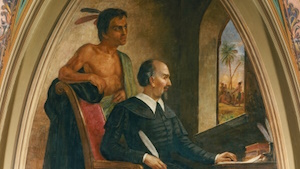
Picture: Bartolomé de Las Casas, early human rights’ activist
Europeans arrived in North, Central and South America over 5 centuries, they brought the Christian faith with them. Life on the frontier was hard, survival was a battle. A few of Christ’s frontier people:-
- 1500s: The Dominican monk, Bartolomé de Las Casas, a vigorous champion for over 50 years of the human dignity and rights of the oppressed natives, he took his protest to the king of Spain.
- 1646: In Canada several French Jesuit missionaries were killed, caught in a disagreement between Iroquois and Huron Indians.
- 1620: The Pilgrims fled religious persecution at home, then enforced their religious code on the colonies. The struggle towards tolerance was led by Roger Williams in Rhode Island, Catholics in Maryland, and Quakers like William Penn.
- 1700's:The Jesuit mission to Paraguay made strong efforts to establish a Christian community among the natives.
- 1784: Only after the signing of the Declaration of Independence did The Episcopal Church of the U.S.A. obtain a Bishop, when Samuel Seabury was appointed by Scottish bishops.
- 1816: Richard Allen, a freed slave, founded the Black Methodist Church.
- 1850: Anglican Allan Gardiner, the forerunner of the South American Missionary Society, died among the struggling Patagonians of Tierra del Fuego.
- 1891: Wilfred Grenfell served the fishing people of Labrador.
- 1909: Bishop Archibald Fleming, Church of England Bishop of the Arctic began his mission on Baffin Is. worked so successfully among the Eskimo that the majority became Christian.
- 1955: Evangelical, Jim Elliott, was killed in the remote jungle of Ecuador.
- 1968: Pastor Martin Luther King Jr., whose faith lead him to become a leader in the Civil Rights Movement was assassinated.
- 1968: Thomas Merton, died, well known as a silent monk, son of a New Zealand father. He is famed as an author and explorer of eastern spirituality.
- 1980: Archbishop Romero of El Salvador, was slain at the altar for his support of his priests in their defence of the cause of the poor. Involvement with the poor in South America provided a powerful stimulus to the development of liberation theology in the 20th century.
From the Great Awakening in 18th century New England, “revival” has been a recurring feature of North American religion. Dwight L. Moody and Billy Graham are among the great revival preachers. The 20th century Pentecostal movement spreading across the USA significantly affected the mainline churches. The tendency for revival Christianity to focus only on a conversion experience and personal faith has not gone unchallenged. Horace Bushnell claimed that a child can “grow up a Christian, and never know himself to be otherwise”. Juan Carlos Ortiz, a Buenos Aires pastor, representing the growing Pentecostal churches of South America, has recently challenged revivalism. He shared a vivid, simple message of radical discipleship of the idea that while we may be Christian and a member of the Kingdom of God that does not mean we are disciple of Christ, a disciple is a “slave of Christ” this is a strong step away from a modern Christianity of a “prosperity” or supposedly “liberation” theology and back towards the theology of the original disciples.
Naive middle class enthusiasm for all things American was challenged by Walter Rauschenbush, whose costly and prophetic ministry among the poor of New York set the vision of the kingdom alongside harsh reality. Reinhold Niebuhr soberly criticized the pious avoidance of public issues of peace and justice and delusions of national godliness amongst his fellow Americans.
The U.S.A. was founded by Christians, its Constitution based on Christian principals. Its 'Bible Belt' still stands strong for God today and the Episcopal Church (Anglican) still has a strong commitment to social work, and its witness extends to every state.
 Welcome
Welcome Calendar
Calendar Today's Word
Today's Word Lauds
Lauds Terce
Terce Sext
Sext None
None Vespers
Vespers Compline
Compline Matins
Matins